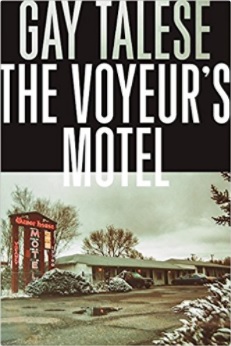Gay Talese on Voyeurism
New York Times Book Review, July 11, 2016 Book ReviewsThe Voyeur's Motel, by Gay Talese. 233 pp. Grove Press. $25.

The average reader will greet more with anger than sadness Gay Talese's disclosure--almost halfway through his book The Voyeur's Motel--that the detailed sex journal underpinning this zany work of nonfiction can't be trusted.
Talese--whose use of the tools of fiction to propel factual accounts helped found New Journalism in the 1960s--drops the self-impeaching evidence casually. Calling into doubt the veracity of his book, Talese writes that the suburban Denver motel owner Gerald Foos claims to have started observing and transcribing the private business of his guests in 1966, peering down at them through 6-by-14-inch surveillance grates he installed in the ceilings of a dozen rooms of his 21-unit motel. The problem with the Foos account, Talese adds, is that he didn't buy Manor House Motel until 1969, meaning that he must have imagined several years of the wild motel bed-sports described in his journal.
Further evidence that the Foos story is cooked: "And there are other dates in his notes and journals that don't quite scan," Talese writes, stating that Foos "could sometimes be an inaccurate and unreliable narrator."
Ordinarily when a journalist discovers profoundly discrediting testimony like this, he utters "Whoa," itemizes the discrepancies and digs deeper. But not so Talese, who only shrugs at the revelation that his main source has lied to him without detailing the fibs. "I cannot vouch for every detail that he recounts in his manuscript," he writes.
Talese doesn't revisit Foos's trustworthiness again until a late chapter where he writes about a motel murder Foos claims to have witnessed but for which he can find no hard evidence. Talese shrugs again: "Over the years, as I burrowed deeper into Foos's story, I found various inconsistencies--mostly about dates--that called his reliability into question." (Foos told Talese that he sold the motel in 1996, but at the end of June the Washington Post reported that Foos had sold the motel in 1980, before reacquiring it in 1988.)
That Foos was an "epic voyeur," as Talese puts it, we can be certain. Talese himself visited the motel in 1980 at Foos's invitation after Foos learned that he was writing a book about sex in America, Thy Neighbor's Wife. Talese accompanied Foos onto the Manor House's shag-carpeted attic catwalk, where the two gazed from above at "an attractive nude couple" from Chicago as they had oral sex.
That Foos wrote with "excellent penmanship" a thick, multiyear journal of motel voyeurship we can also be fairly certain. Foos shares the document with Talese, who reproduces massive portions of it here. By my rough count, excerpts from the motelkeeper's sex journal make up about 80 of the book's 233 pages, rendering Foos a partner in duet with Talese if not his uncredited co-author.
But provided no assurance that anything but the most basic framework of the Foos story is true, how engaged can the reader be with its clinical descriptions of people getting it on with themselves, getting it on with a spouse or lover, or getting it on in a group? How engaged should any reader be with Talese's credulous treatment of his voyeur's life story and his journal? Not very. Read as erotica, the Foos-Talese collaboration does not arouse. Viewed as a social history--Talese compares Foos's journals to My Secret Life, a 4,000-page anonymous memoir about the Victorian era's sexual underground--it doesn't enlighten.
Approached as a scientific investigation--Foos repeatedly expresses his "higher purpose" to use his motel "laboratory" for "observing people in their natural state" in pursuit of discoveries like those made by sexologists at the Masters and Johnson clinic and the Kinsey Institute--his work is not even crackpot. Perhaps we can park The Voyeur's Motel in the safe harbor of the memoir, which in recent years has been freed from the necessity of having to tell the absolute truth. But providing Talese this exemption would cut against his lifelong method, which has always been based on telling the story straight.
For such a freaky story about such a secret life, The Voyeur's Motel turns remarkably bloodless once the shock of Foos's alleged intrusions into the privacy of up to 300 guests a year expires. The joy of sex becomes the job of sex, as Talese and Foos heap upon the reader endless and undifferentiated accounts from the journals of smutty dialogue, masturbation, three-ways, toilet habits, cross-dressing, dildo action and even sex with teddy bears. If hell is writing about another person who has watched hundreds of people having sex, Talese may have discovered Hades.
As you might suspect, Talese writes with his usual elegance, putting a stylistic shine on his end of the collaboration. But the journalistic enterprise that was on display in his earlier work about sex, about the mob (Honor Thy Father, 1971) and about his Italian heritage (Unto the Sons, 1992) is absent here as Talese fails to find something insightful to say about his taboo-shattering motelier. The novelistic techniques of New Journalism succeed in putting him and the reader inside Gerald Foos's now-famous crawl space, but they never really extricate him from the banality of the peep hole.
